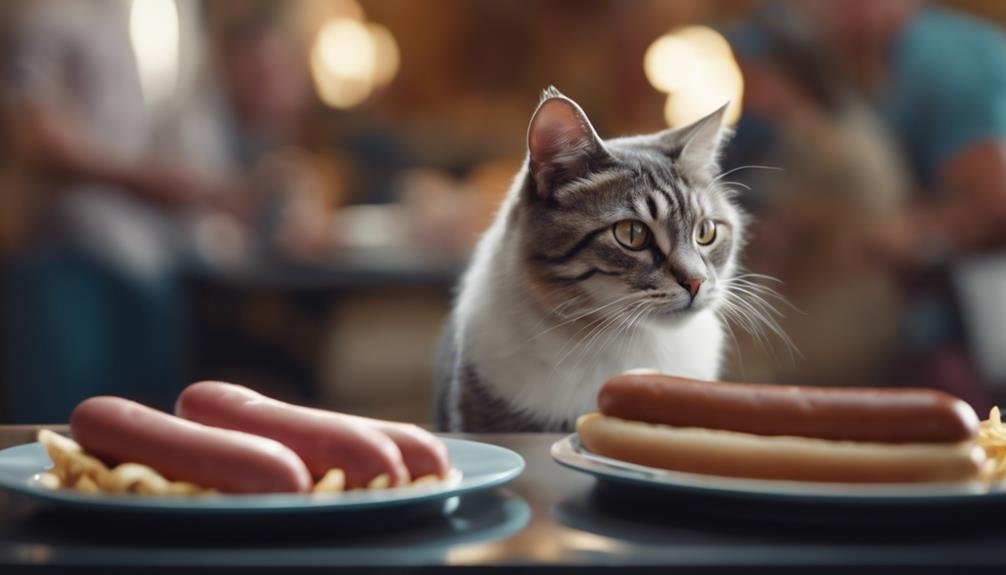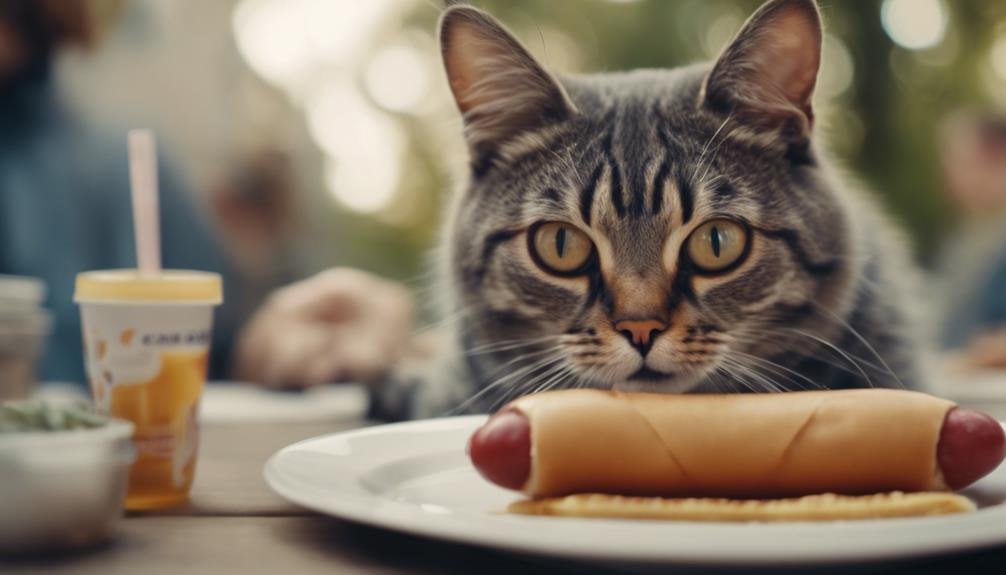When considering the dietary choices for feline companions, the question of whether cats can consume hot dogs raises concerns about the potential consequences of offering this popular human food to our four-legged friends.
Exploring the nutritional implications of feeding hot dogs to cats unveils a complex interplay between the ingredients in this processed meat and the unique dietary requirements of felines.
Understanding why hot dogs might not be the best option for your cat's health can shed light on safer alternatives that cater more effectively to their obligate carnivorous nature.
Key Takeaways
- Hot dogs pose health risks due to high sodium and fat content.
- Cats may experience digestive issues and appetite changes from consuming hot dogs.
- Opt for safe meat options like chicken, shrimp, turkey, and salmon for cats.
- Prioritize a balanced diet rich in animal-based proteins for feline well-being.
Cats Are Obligate Carnivores
Cats' dietary requirements are based on their nature as obligate carnivores. This means that cats must consume meat to meet their nutritional needs adequately. Due to their physiology, cats rely on nutrients found in animal tissues to thrive. Proteins, amino acids like taurine, vitamins A and B, and fatty acids are crucial components of a cat's diet.
Therefore, offering a balanced diet rich in animal-based proteins is essential for their overall well-being. When considering what to feed your feline friend, it's vital to prioritize meat-based options that align with their carnivorous nature. By understanding and respecting cats' biological requirements, you can ensure they receive the necessary nutrients to lead a healthy life.
Risks of Feeding Hot Dogs to Cats
Feeding hot dogs to cats poses significant risks due to their high sodium and fat content, which can lead to various health issues.
- Digestive Upset: Hot dogs can cause vomiting and diarrhea in cats due to their high fat content.
- Decreased Appetite: Consuming hot dogs may lead to a loss of appetite in cats, affecting their overall nutrition.
- Training Concerns: Using hot dogs for training purposes can make cats unwell and may not be effective in reinforcing positive behavior.
- Healthier Options: While all-beef, chicken, or turkey hot dogs are slightly healthier, they are still too big and impractical as treats for cats.
Handling Cats Who Ate Hot Dogs

In cases where cats have consumed hot dogs, it is crucial to monitor for any signs of digestive upset or changes in appetite. Keep a close eye on your cat for symptoms like vomiting, diarrhea, or a decreased interest in food. If any concerning signs arise, it is advisable to contact your primary care veterinarian promptly for further guidance.
Additionally, be cautious of counter surfing behaviors that may lead to accidental ingestion of harmful foods. To prevent this, provide alternative enrichment options on different surfaces to keep your cat engaged and distracted. Remember never to leave food unattended, as it can pose risks to your cat's health and well-being.
Safe Meats for Cats
When considering suitable meat options for feline companions, it is important to prioritize their carnivorous dietary needs.
- Freeze-dried chicken and shrimp offer nutritious alternatives.
- Turkey, salmon, tuna, and boiled chicken are safe choices in moderation.
- Freeze-dried treats provide convenience and storage benefits.
- Churu is a high-value option that cats tend to enjoy.
These options align with cats' obligate carnivore status, ensuring they receive the necessary nutrients while also appealing to their taste preferences.
All-Beef, Chicken, and Turkey Dogs

Selecting all-beef, chicken, and turkey dogs as alternative treats for cats entails considering their nutritional value and suitability for feline consumption. While these options may seem slightly healthier than traditional hot dogs, they still present challenges when it comes to size and practicality as cat treats.
All-beef, chicken, and turkey dogs can be high in sodium and fat, which are not ideal for a cat's diet. Additionally, their size makes them difficult for cats to consume safely.
When choosing treats for your feline friend, opt for options specifically designed for cats, such as freeze-dried chicken or shrimp, turkey, salmon, tuna, or boiled chicken, which are safer and more suitable for their dietary needs.
Related Articles on Cat Nutrition
Exploring essential resources on feline nutrition can help cat owners make informed decisions regarding their pets' dietary needs. When it comes to understanding what cats can and cannot eat, staying informed is crucial.
Here are some related articles on cat nutrition worth exploring:
- Can Cats Eat Raw Chicken?
- Best Online Cat Food Delivery Services
- Ways to Save Money on Dog Food
- Why Do Cats Eat Plastic?
These articles cover a range of topics from specific dietary questions to practical tips on purchasing cat food. By delving into these resources, cat owners can gain valuable insights into providing their feline companions with a well-balanced and nutritious diet.
Ensuring Cats' Health and Safety

Ensuring the well-being of cats involves prioritizing their health and safety through mindful care practices. Monitoring their diet, ensuring they have access to fresh water, and creating a safe environment are essential.
Regular veterinary check-ups, vaccinations, and parasite control also play a crucial role in maintaining their health. It's important to be mindful of potential hazards in the home, such as toxic plants, small objects that could be ingested, and open windows that pose a falling risk.
Providing mental and physical stimulation through toys, scratching posts, and interactive playtime is vital for their overall well-being. By being attentive to their needs and surroundings, you can create a safe and nurturing environment for your feline companion.
Conclusion
In conclusion, cats' obligate carnivorous nature necessitates a diet rich in meat-based protein sources. Feeding hot dogs to cats can pose risks due to their high sodium and fat content, potentially leading to health issues.
Opting for safer meat options like freeze-dried chicken or shrimp aligns better with cats' nutritional needs. By prioritizing their feline companions' well-being and selecting appropriate foods, pet owners can ensure the health and safety of their beloved cats.




